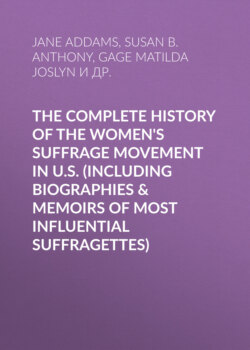Читать книгу The Complete History of the Women's Suffrage Movement in U.S. - Jane Addams - Страница 39
На сайте Литреса книга снята с продажи.
NEW ENGLAND WOMAN'S RIGHTS CONVENTION.
ОглавлениеBoston, Friday, June 2, 1854.
This Convention assembled the day on which poor Anthony Burns was consigned to hopeless bondage;50 and though many friends of the woman movement remained in the streets to see his surrender, still at an early hour the hall was literally crowded with earnest men and women, whom a deep interest in the cause had drawn together. Sarah H. Earle, of Worcester, was chosen President; Lucy Stone, Chairman of the Business Committee, reported the resolutions, among which we find the following:
Resolved, That the Common Law, which governs the marriage relation, and blots out the legal existence of a wife, denies her right to the product of her own industry, denies her equal property rights, even denies her right to her children, and the custody of her own person, is grossly unjust to woman, dishonorable to man, and destructive to the harmony of life's holiest relation.
Resolved, That the laws which destroy the legal individuality of woman after her marriage are equally pernicious to man as to woman, and may give to him in marriage a slave, or a tyrant, but never a wife.
William Lloyd Garrison, Emma E. Coe, Josephine S. Griffing, Wendell Phillips, Dr. Harriot K. Hunt, Rev. S. S. Griswold, Sarah Pellet, Abby Kelly Foster, Mrs. Morton, and Lucy Stone took part in the debates. Letters were received from Thomas W. Higginson, Rev. A. D. Mayo, Paulina Wright Davis, Mrs. Nichols, and Sarah Crosby. Francis Jackson,51 of Boston, made a contribution of $50. Committees were appointed from each of the New England States to circulate petitions for securing a change in the laws regulating the property of married women, and limiting the right of suffrage to men. All the sessions drew crowded audiences, and the enthusiasm was sustained to the end. The sympathy for Burns intensified the feelings of those present against all forms of oppression. Those who had witnessed the military parade through the streets of Boston to drive the slave—a minister of the Baptist denomination in his southern home—from the land of the Pilgrims where he had sought refuge, were roused to plead with new earnestness and power for equal rights to all without distinction of sex or color.
